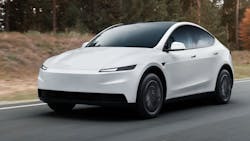Musk Says Tesla Ready to Ramp Output ‘As Fast As We Reasonably Can’
Higher costs ate into Tesla Inc.’s third-quarter margins but CEO Elon Musk told investors and analysts he is now confident enough in the company’s self-driving technology to have the electric-vehicle market leader “expand as fast as we reasonably can.” Executives also plan to “substantially” increase capital spending in 2026.
Austin-based Tesla produced a net profit of $1.37 billion on $28.1 billion of total revenues in the three months that ended Sept. 30, during which it delivered more than 497,000 vehicles. That last figure was up 7% from the same period of 2024 and helped by consumers stepping up to buy cars ahead of the Sept. 30 expiration of $7,500 tax credits. The company’s operating margin for the quarter was 5.8%, which was five points lower than in 2024’s Q3 but up from 4.1% in this year’s second quarter.
Profits were down 37% from a year earlier due to operating expenses popped 50%, which CFO Vaibhav Taneja attributed in part to work on artificial intelligence chips, legal costs and spending on the company’s shareholder meeting, which will decide the $1 trillion long-term pay plan Tesla’s board has proposed for Musk.
Taneja said that Tesla’s capital spending is on pace to total $9 billion this year but will rise “substantially” next year as executives eye the company’s next phase of automotive growth as well as initiatives in AI, including the Optimus robot. But officials also said that tariffs and product mix also hurt the profitability of their car operation.
That goal and Musk’s comment about ramping up production suggests costs will climb further in coming quarters—even as the end of tax credits has left the EV market in limbo. (Musk in July said losing the incentives could result in “a few rough quarters” for his company.) General Motors Corp. CFO Paul Jacobson said earlier this week that his team expects sales, which already have fallen off this month, to maybe find their natural levels in early 2026.
“Our intent is to expand as quickly as we can,” Musk said. “I was reticent to do that until we had clarity on achieving unsupervised full self-driving. But at this point, I feel like we’ve got clarity and it makes sense to expand production as fast as we can.”
Today, Tesla has the capacity at its factories in California, Texas, Berlin and Shanghai to make more than 2.2 million of its 3, S and Y cars. The company also can produce about 125,000 cybercabs in Texas and Musk said increasing production of that model will be one of his team’s 2026 priorities.
Asked if the production plans imply that Tesla is willing to give up some of its profitability to grow its market share, Musk was clear.
“Do I think we’ll sacrifice margins? I don’t think so,” he said of the cybercab. “I think demand will be pretty nutty.”
Shares of Tesla (Ticker: TSLA) fell nearly 3% to roughly $426 in after-hours trading Oct. 22, when the company released its earnings and hosted its conference call. They are still up more than 80% over the past six months, a surge that has grown the company’s market capitalization to about $1.4 trillion.
About the Author
Geert De Lombaerde
Senior Editor
A native of Belgium, Geert De Lombaerde has been in business journalism since the mid-1990s and writes about public companies, markets and economic trends for Endeavor Business Media publications, focusing on IndustryWeek, FleetOwner, Oil & Gas Journal, T&D World and Healthcare Innovation. He also curates the twice-monthly Market Moves Strategy newsletter that showcases Endeavor stories on strategy, leadership and investment and contributes to other Market Moves newsletters.
With a degree in journalism from the University of Missouri, he began his reporting career at the Business Courier in Cincinnati in 1997, initially covering retail and the courts before shifting to banking, insurance and investing. He later was managing editor and editor of the Nashville Business Journal before being named editor of the Nashville Post in early 2008. He led a team that helped grow the Post's online traffic more than fivefold before joining Endeavor in September 2021.
